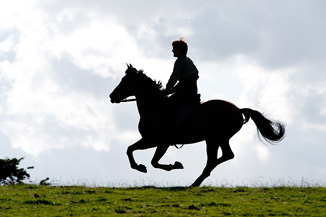Movie Review: War Horse
By Matthew Huntley
January 10, 2012
BoxOfficeProphets.com

The story has the kind of classic tone that resonated in films of the 1930s, free of cynicism and filled to the brim with underlying hope. In Devon, Ireland, just before World War I, a poor farmer named Ted Narracott (Peter Mullan) hastily (and drunkenly) bids on a horse in a local auction to spite his smug landlord (David Thewlis). But the horse is too skinny and jumpy to pull a plow, which is what Narracott needs it for, and so he ends up with a seemingly useless animal and an even greater line of debt. His wife (Emily Watson) gives him one month to train it; otherwise she vows to return the horse herself and beseech the landlord for forgiveness. But their son, Albert (Jeremy Irvine), who saw the young thoroughbred come into the world, sees a golden opportunity to raise it as his own.
Albert names the horse Joey and teaches him some basic commands, but the horse is only good to him if he can pull a plow, and so Albert puts himself out there and proves he’s willing to do the same things he asks of the horse, as if the two are equals. If he wants Joey to wear a strap around his neck, Albert will wear one too. Like most young people with a love for animals, Albert instinctually knows what to do so Joey doesn’t feel threatened, like when he feeds him oats for the first time and carefully avoids looking him in the eye.
Naturally, Albert and Joey form a bond, which might not have come across as strongly or touchingly had Spielberg and screenwriters Richard Hall and Richard Curtis, working from the novel by Michael Morpurgo, not taken the time to develop their friendship with patience and credible action. The film is anything but hasty in the way it shows the horse forming relationships with the human characters and we sense it learning and appreciating all that is being done for him. After all, this is really the horse’s story, a concept that comes across clearly and without irony, thus allowing us to identify with Joey and care for him deeply.
When the war finally does come, Narracott has no choice but to sell Joey. Captain Nicholls (Tom Hiddleston) of the British cavalry promises Albert he’ll care for the animal and hopefully return him safely. This begins the horse’s odyssey around different parts of Europe, where it befriends and touches many affected by war, including a larger black horse; a couple of German brothers (David Kross and Leonhard Carow) likely conscripted by the army but too young for battle; a French girl (Celine Buckens) living with her wise grandfather (Niels Arestrup); a compassionate German soldier (Nicholas Bro); and eventually the entire British infantry.
Whether or not Joey makes his way back to Albert is not for me to say, but I can tell you the horse’s journey is thoroughly engaging and entertaining because Spielberg allows the scenes between the horse and humans to reflect truth instead of forced melodrama. We recognize these moments as the kind we might have shared with our own pets, or perhaps even our children and friends. Spielberg wisely avoids making the horse “cute,” and he certainly doesn’t undermine its intelligence just because it’s an animal. He respects him and, as a result, we believe the way Joey behaves and feels for other living things. We sense this in his reaction shots, and whether or not real horses act like Joey does isn’t the point; what matters is we believe him in the context of the story.
It would have been wrong to sugarcoat the war scenes, even for a family picture, because no matter what, war is not a clean, pleasant experience. Spielberg is right to film the battle scenes brutally and realistically. They’re tame enough so younger viewers can watch them and not cover their eyes, yet strong enough so they’re hard-hitting and effective. Through them all, though, Spielberg never loses sight of the central story, which is really about Joey. The movie’s best scene finds two soldiers, each on opposing sides, meeting in the middle of a battle field and exchanging words for the sake of the horse. The dialogue here is especially genuine and the intercutting between the humans and the close-ups of the horse give it a richness and depth that make it all the more beautiful.
Let it be said that War Horse has more than its fair share of heavy sentimentality, which is sure to leave some audience members tasting cheese. However, I can forgive the movie for these moments because, given the old-fashioned story and storytelling, they just seemed appropriate. We have the idealistic characters who constantly look like they’re on the verge of tears; the arguably contrived moment of vindication where a symbol from the beginning shows up just in the nick of time at the end; and the somewhat over-the-top closing scene that’s a blatant homage to Gone with the Wind. Sure, these moments can be a bit much, but they work.
We don’t often see movies like War Horse anymore, probably because they’re expensive to make and not as easy to sell. Even though the story is simple, it still captivates us and the production is striking. Just as Joey makes connections with the human characters, we connect to this movie. That may sound cheesy, but for a movie like War Horse, it also sounds right.